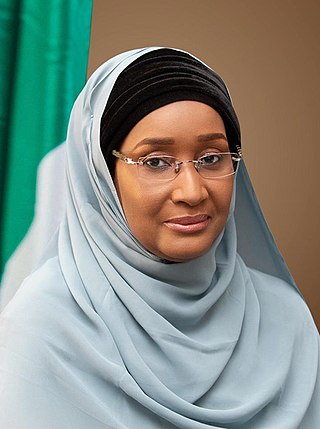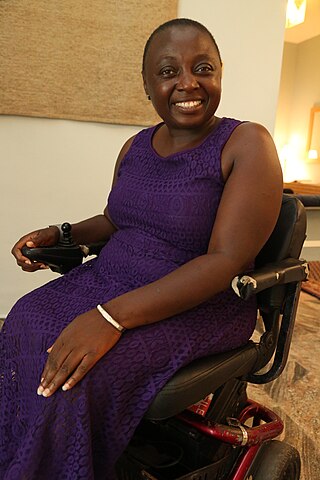Related Research Articles
Nigeria is Africa's largest ICT market, accounting for 82% of the continent's telecoms subscribers and 29% of internet usage. Globally, Nigeria ranks 11th in the absolute number of internet users and 7th in the absolute number of mobile phones.

The U.S. Equal Employment Opportunity Commission (EEOC) is a federal agency that was established via the Civil Rights Act of 1964 to administer and enforce civil rights laws against workplace discrimination. The EEOC investigates discrimination complaints based on an individual's race, color, national origin, religion, sex, age, disability, genetic information, and retaliation for participating in a discrimination complaint proceeding and/or opposing a discriminatory practice.
Universal design is the design of buildings, products or environments to make them accessible to people, regardless of age, disability or other factors. It addresses common barriers to participation by creating things that can be used by the maximum number of people possible. Curb cuts or sidewalk ramps, which are essential for people in wheelchairs but also used by all, are a common example of universal design.
In the late 20th and early 21st centuries, a number of countries have passed laws aimed at reducing discrimination against people with disabilities. These laws have begun to appear as the notion of civil rights has become more influential globally, and follow other forms of anti-discrimination and equal opportunity legislation aimed at preventing racial discrimination and sexism which began to emerge in the second half of the 20th century. Many of these Acts aim to reduce barriers for persons with disabilities in the areas of customer service, employment, built environment, transportation, and information and communications.

The Economic and Financial Crimes Commission (EFCC) is a Nigerian law enforcement agency that investigates financial crimes such as advance fee fraud and money laundering. The EFCC was established in 2003, partially in response to pressure from the Financial Action Task Force on Money Laundering (FATF), which named Nigeria as one of 23 countries non-cooperative in the international community's efforts to fight money laundering. The agency has its head office in Abuja, Nigeria.

Inclusion, in relation to persons with disabilities, is defined as including individuals with disabilities in everyday activities and ensuring they have access to resources and opportunities in ways that are similar to their non-disabled peers. Disability rights advocates define true inclusion as results-oriented, rather than focused merely on encouragement. To this end, communities, businesses, and other groups and organizations are considered inclusive if people with disabilities do not face barriers to participation and have equal access to opportunities and resources.

Corruption is an anti-social attitude awarding improper privileges contrary to legal and moral norms and impairs the authorities' capacity to secure the welfare of all citizens. Corruption in Nigeria is a constant phenomenon. In 2012, Nigeria was estimated to have lost over $400 billion to corruption since its independence.

The Independent National Electoral Commission (INEC) is the electoral body which oversees elections in Nigeria. It was established in 1998 shortly before Nigeria's transition from military to civilian rule.

Abike Kafayat Oluwatoyin Dabiri-Erewa is a Nigerian politician and former member of the Nigeria Federal House of Representatives representing Ikorodu Constituency in Lagos State. She was the Chairman of the House Committee on Media & Publicity.
Ableism is discrimination and social prejudice against people with disabilities and/or people who are perceived as being disabled. Ableism characterizes people as they are defined by their disabilities and it also classifies disabled people as people who are inferior to non-disabled people. On this basis, people are assigned or denied certain perceived abilities, skills, or character orientations.

Sadiya Umar Farouq, is a Nigerian politician and the current Minister of Humanitarian Affairs, Disaster Management and Social Development.
Estimates vary for the number of people with disabilities in Nigeria. The World report on disability, published in 2011, said about 25 million Nigerians had at least one disability, while 3.6 million of these had very significant difficulties in functioning. The 2006 Nigerian census reported 3,253,169 people with disabilities, or 2.32% of the total population of 140,431,790 in that year. However, the Centre for Citizens with Disabilities, a Nigerian NGO, claims the census did not capture the full extent of disability in Nigeria, and has called on Nigeria's National Population Commission to cooperate with the Ministry of Women Affairs and Social Development for the 2016 census in order to measure disability more accurately. As at 2020, there are reportedly over 27 million Nigerians living with some form of disability.

Lois Autapronunciation is the founder and chief executive officer at the Cedar Seed Foundation, an organization that promotes the participation of women with disabilities into human rights based development in Nigeria. She focuses on inclusive legislation for people with disabilities.
The National Agency for the Prohibition of Trafficking in Persons (NAPTIP) is a law enforcement agency of the Federal Government of Nigeria, founded on the 14th of July, 2003 by the Trafficking in Persons (Prohibition) Enforcement and Administration Act of 2003 in order to combat human trafficking and other similar human rights violations.
People with disability in Liberia face many challenges. The cultural attitude towards disability in Liberia is largely negative. Often, it is seen as the result of witchcraft or as punishment for a person's behavior. However, the government and non-governmental organizations (NGO) are working towards a more inclusive country for people with disabilities.
Around 35,000 people in Belize have a disability. There are efforts to raise awareness about people with disabilities in Belize and counter social stigma. Several non-governmental organizations, including Special Olympics, help increase awareness and the government sponsors an annual Disability Week. Services for people with disabilities is limited and most areas of the country have limited accessibility.

The Federal Ministry of Humanitarian Affairs, Disaster Management and Social Development is a Nigerian ministry whose mission is to develop humanitarian policies and provide effective coordination of National and International humanitarian interventions. It was established on Wednesday August 21, 2019 by an Executive pronouncement by the President and Commander in Chief of the Armed Forces of Nigeria, H.E., Muhammadu Buhari GCFR at the inauguration of Ministers for the Federal Republic of Nigeria.
Fatima Waziri-Azi is a Nigerian lawyer and the Director General of the National Agency for the Prohibition of Trafficking in Persons (NAPTIP) of Nigeria. Before her appointment at NAPTIP she was an advisor on the rule of law to the President of Nigeria, Muhammadu Buhari. She is a former Head of Department of Public Law at the Nigerian Institute of Advanced Legal Studies and she is a woman rights advocate and a campaigner against domestic and sexual based violence.
The National Senior Citizens Act, 2018 is an act which was passed by the Federal Government of Nigeria to cater for the needs of the senior citizens. The act was signed into law by President Muhammadu Buhari and led to the establishment of the National Senior Citizens Centre in Nigeria to cater for the needs of the senior citizens. The National Senior Citizens Centre is domiciled with the Federal Ministry of Humanitarian Affairs, Disaster Management and Social Development.
The Irede foundation (TIF) is a foundation established in 2012 by Crystal Chigbu to educate Nigerians on congenital and acquired limb loss, and how to associate with and care for children with this kind of loss. The foundation provides free and subsidized artificial limbs for children who cannot afford them. They focus on children within the ages of 0–18 years. The foundation has a laboratory in Lagos for assembling prosthetics. The foundation was named the humanitarian foundation of the year in 2017 by Green October Event 2017.
References
- ↑ "Home". NCPD. Retrieved 2022-03-29.
- ↑ "Farouq inaugurates governing council of Nat'l Commission for Persons with Disabilities". Vanguard News. 2020-12-22. Retrieved 2022-03-29.
- ↑ "The significance of Disability Commission". The Guardian Nigeria News - Nigeria and World News. 2020-10-21. Retrieved 2022-03-29.
- ↑ "2019 Disability Day: FG to establish National Commission for Persons with". 2019-12-03. Retrieved 2022-03-30.
- ↑ Abdullateef, Ismail (2020-07-07). "Establishment Of National Commission For Persons With Disability On Course - Farouq". Federal Ministry of Information and Culture. Retrieved 2022-03-30.
- ↑ "President Buhari Confers Umar Farouq, 43 Others With Nigeria Excellence Award In Public Service - Heritage Times". 2022-10-21. Retrieved 2023-03-04.
- ↑ Y, Mukhtar (2022-11-28). "CG Audi Makes Case for People with Disabilities, Sets up Duty Desks Nationwide". PRNigeria News. Retrieved 2023-03-04.
- ↑ "Nigeria: PWDs Will Vote Leaders Without Religious Bias- James Lalu - Heritage Times". 2022-12-12. Retrieved 2023-03-04.
- ↑ https://www.inclusion.com.ng/amp/xtraying-the-footprints-of-james-david-lalu-in-the-sands-of-time-understanding-disabilities-and-the-struggles-for-freedom/
- ↑ "NCPWD | Home". ncpwd.gov.ng. Retrieved 2023-03-18.